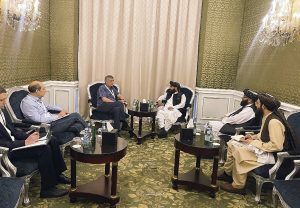The recent conference in Doha, Qatar on Afghanistan, led by the United Nations and involving representatives from the Taliban regime for the first time, has once again brought attention to a critical issue: the exclusion of Afghan women.
As delegates convened to deliberate on the future of Afghanistan, the exclusion of women from the meeting was met with widespread criticism. That criticism conveyed a strong message: The exclusion of Afghan women from such discussions not only jeopardizes the potential for genuine, sustainable, and all-encompassing peace but also undermines the fundamental values of equality and justice that should form the basis of any transitional process.
The recent Doha talks, referred to as “Doha 3,” aimed to foster dialogue among diverse stakeholders regarding the future of Afghanistan. Notably, the omission of Afghan women’s perspectives represents a stark deviation from the principles outlined in U.N. Security Council Resolution 1325, which emphasizes the importance of including women in conversations related to peace and security and supports their meaningful participation.
Afghan women activists and civil society organizations have voiced strong consternation regarding their exclusion from the primary sessions of the conference. Mariam (not her real name), a women’s rights activist interviewed, asserted that any substantive discourse concerning the future of Afghanistan is incomplete without the comprehensive and substantive involvement of women, who have disproportionately suffered from the Taliban’s deliberate suppression of their rights.
The U.N.’s decision to accede to the Taliban’s demands, reportedly including the omission of discussions on human rights issues, has heightened the apprehensions of Afghan women. It is perceived as a breach of the U.N.’s commitments to uphold human rights and guarantee the involvement of diverse perspectives in the reconstruction endeavors post-conflict.
Afghan women raised concerns in anticipation of the conference, criticizing the U.N. for extending an invitation to the Taliban and for making compromises by excluding Afghan women from participation and omitting women’s rights from the agenda. Mursal, another woman interviewed, contended that any discussion of critical matters in Afghanistan would be futile without addressing human rights and the rights of women to pursue education and employment.
Since their exclusion from the conference, Afghan women advocated for a boycott of the meeting, citing the marginalization of women’s voices as potentially legitimizing the Taliban’s oppressive policies and gender discrimination. Fatima, another woman interviewed, stressed that the international community’s failure to secure the participation of Afghan women could have enduring implications for the nation’s future, especially for the female population who has been the target of the Taliban’s systematic oppression and discriminatory policies since their takeover in August 2021 and during their previous regime.
Sadaf, a human rights activist, raised objections to the U.N.’s decision to include the Taliban in the Doha meeting rather than holding them accountable for their actions against Afghan women and girls. She asserted that the situation of women in Afghanistan constitutes the most severe women’s rights crisis globally and continues to deteriorate each day.
It is indisputable that Afghan women have played a pivotal role in grassroots initiatives aimed at achieving peace and stability in their nation. They have demonstrated unwavering resilience and determination in endeavors related to education, healthcare advocacy, governance, and civil society. The exclusion of Afghan women from the process of shaping the country’s future would constitute a significant injustice and a strategic oversight.
The Doha talks missed a crucial opportunity for the U.N. to showcase its dedication to upholding the principles of women’s involvement in peace, security, and post-conflict reconstruction processes. By marginalizing Afghan women, the U.N. risks perpetuating the very injustices it aims to address and undermines the potential for a sustainable and comprehensive peace in Afghanistan.

































